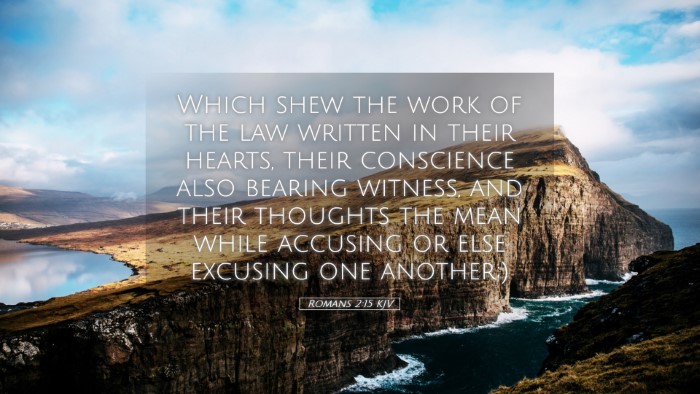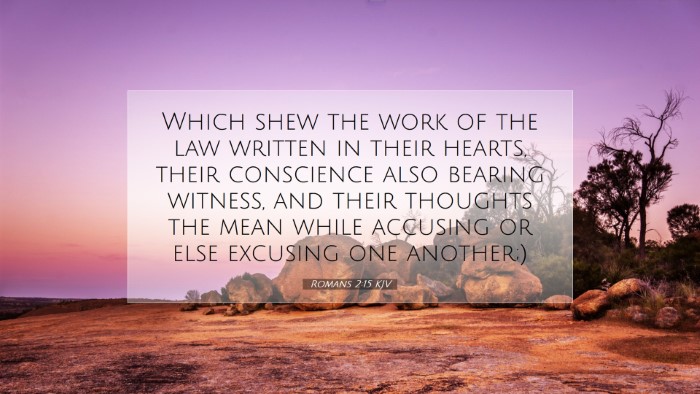Commentary on Romans 2:15
Romans 2:15 (ESV): "They show that the work of the law is written on their hearts, while their conscience also bears witness, and their conflicting thoughts accuse or even excuse them."
Overview
The apostle Paul, in this verse, addresses the universal moral awareness that exists within all humanity. He highlights that even those who do not possess the written law still demonstrate an inherent understanding of right and wrong, which points to God's moral law being inscribed upon their hearts.
Insights from Matthew Henry
Human Conscience and the Law: Henry highlights the idea that the function of the moral law is not limited to those who possess the Scriptures; rather, it extends to Gentiles who exhibit the inherent understanding of righteousness. He notes that this innate sense of morality serves as a testimony to God's justice and righteousness.
- Conscience as a Witness: Henry elaborates on the conscience as an internal witness, either accusing or excusing one's actions. This self-scrutiny is a universal experience, showing that moral law is a fundamental aspect of the human experience.
- Divine Accountability: The presence of internal moral laws emphasizes human accountability before God, suggesting that judgment will be based not solely on revealed law but also on the moral intuitions given by God to every person.
Insights from Albert Barnes
The Work of the Law: Barnes expounds upon the phrase “work of the law.” He indicates that this work transcends mere written regulations, encompassing the ethical and moral imperatives understood by human beings universally.
- Natural Law: According to Barnes, this verse points towards the concept of natural law, where the moral dictates of God are accessible to human reason. Barnes posits that all people have an obligation to follow this moral compass.
- Conflicting Thoughts: Barnes emphasizes how conflicting thoughts can lead to inner turmoil, suggesting that the struggle between moral understanding and sinful desires is a common plight among all individuals. This inner conflict serves as evidence of the law's presence within them.
Insights from Adam Clarke
Testimony of the Heart: Clarke identifies the heart as the seat of moral consciousness, a profound source consistently echoing God’s law. He clarifies that this testimony works to convince individuals of their moral failure unless they suppress it through sin.
- Accusation and Justification: Clarke asserts that the duality of thought—accusing or excusing—reveals a continuous dialogue within the soul about righteousness. This dynamic reflects the active engagement of divine law within human conscience.
- Divine Justice: Clarke emphasizes that God's justice holds everyone accountable, regardless of their access to the written law. The presence of the law within the hearts of all people guarantees that moral decisions are significant in the eyes of the Creator.
Theological Implications
This verse speaks volumes about the nature of humanity created in the image of God. Pastors and theologians are called to consider the profound implications of the law written upon hearts, as it confirms God’s universal moral order.
- Moral Responsibility: The inherent moral understanding challenges any notion that humanity is without moral accountability. It calls for a robust engagement with culture, affirming that all people know, intuitively, about the moral standards of God.
- Evangelistic Challenge: For evangelism, the insights from this passage can strengthen the case for the gospel, as every person has an innate understanding of sin, thus providing fertile ground to discuss the necessity of Christ's redemption.
- Common Grace: The conscience serves as an agent of common grace; it guides individuals towards God’s standards of righteousness, providing both moral clarity and a poignant reminder of the need for divine grace through Christ.
Conclusion
Romans 2:15 serves as a powerful reminder of the universality of God’s moral law and the functioning of conscience in human life. The insights from public domain commentaries remind us that all individuals bear the marks of divine morality. Understanding this can deepen our discipleship, theology, and engagement with both believers and non-believers, reinforcing the relevance of scriptural teachings in addressing sin, morality, and the need for salvation through Jesus Christ.


